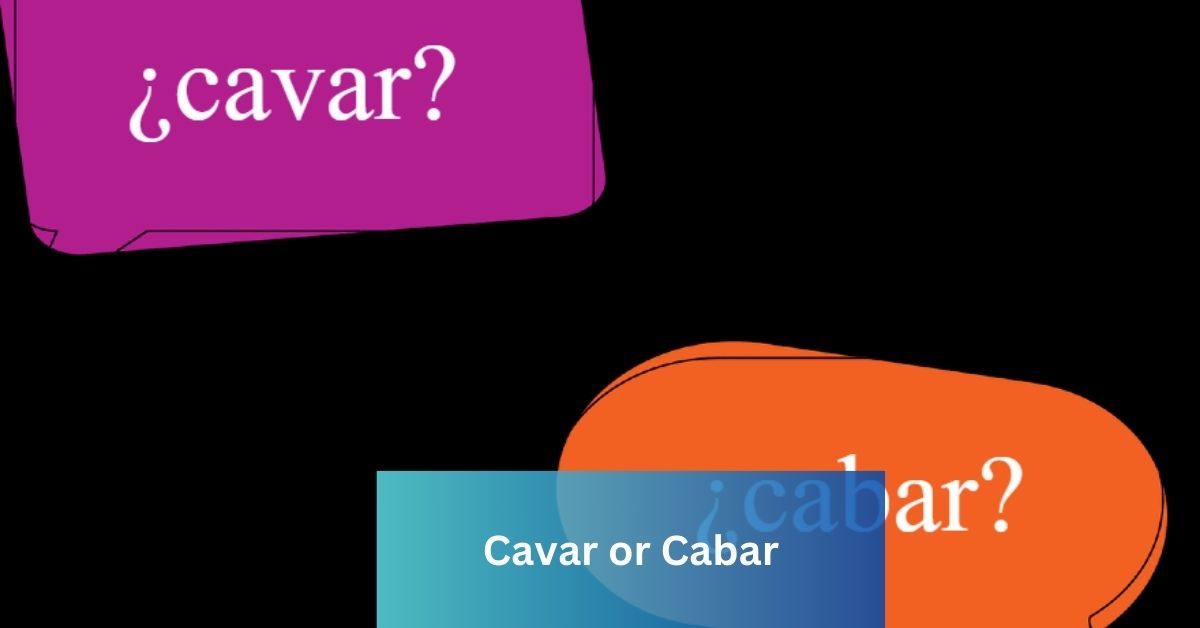https://tanfacil.net/educacion/como-se-escribe-cavar-o-cabar-3869.html The article on tanfacil.net titled “Cómo se escribe cavar o cabar” provides a comprehensive guide on distinguishing between the Spanish verbs “cavar” and “cabar”.
It covers the importance of correct spelling and word usage, differences in definitions, origins, and conjugations, as well as common mistakes and tips for remembering the distinction. The article also offers examples, mnemonic devices, and additional resources for further learning, making it a valuable resource for Spanish language learners and enthusiasts.
Introduction:
In the vast landscape of language, mastering correct spelling and usage of words is paramount for effective communication. One particular challenge that often perplexes individuals is distinguishing between “cavar” and “cabar” in Spanish.
This article aims to provide comprehensive insights into these verbs, elucidating their differences, usage, and common misconceptions.
Explanation of the Topic:
The topic at hand delves into the proper spelling and usage of the Spanish verbs “cavar” and “cabar”. Despite sounding identical when spoken, they differ significantly in their orthography and meaning https://tanfacil.net/educacion/como-se-escribe-cavar-o-cabar-3869.html .
Importance of Correct Spelling and Usage of Words:
Precision in language is indispensable as it ensures clarity and eliminates misunderstandings. Incorrect spelling or usage of words can lead to confusion, hindering effective communication and comprehension.
Difference Between “Cavar” and “Cabar” https://tanfacil.net/educacion/como-se-escribe-cavar-o-cabar-3869.html
The disparity between “cavar” and “cabar” lies primarily in their legitimacy and acceptance within the Spanish language.

While “cavar” is a recognized verb with a defined meaning, “cabar” lacks legitimacy and is considered a spelling error.
Definitions of Both Words:
- Cavar: The verb “cavar” denotes the action of digging, excavating, or making a hole in the ground using tools like a shovel or pickaxe.
- Cabar: This term does not exist in standard Spanish and is considered a misspelling of “cavar”.
Origin and Etymology:
The origin of “cavar” can be traced back to the Latin word “cavare”, meaning “to dig”. Over time, it evolved into its current form in Spanish.
Usage of “Cavar”:
“Cavar” finds application in various contexts, including agriculture, construction, and exploration. For instance, farmers use it when preparing soil for planting, while archaeologists employ it during excavations.
Examples and Contexts Where “Cavar” is Used:
- The construction workers were busy digging a foundation for the new building.
- She carefully caved out a hole in the garden to plant the saplings.
- Archaeologists unearthed ancient artifacts while excavating the site.
Conjugation in Different Tenses:
The conjugation of “cavar” follows the regular pattern for Spanish verbs ending in -ar. It includes forms such as cavé, cavaste, cavó, cavamos, cavasteis, and cavaron for the past tense.
Usage of “Cabar”:
As mentioned earlier, “cabar” is not a valid term in Spanish and should be replaced with “cavar” to convey the intended meaning accurately.
Examples and Contexts Where “Cabar” is Used:
Since “cabar” is not a legitimate Spanish word, it is not used in any context. However, it is often mistakenly employed by individuals who are unaware of the correct spelling and usage of “cavar”.
Conjugation in Different Tenses:
Given that “cabar” is not a valid verb, it does not have conjugation forms.
Common Mistakes and Confusion:
The primary source of confusion stems from the phonetic similarity between “cavar” and “cabar”. As a result, individuals often interchange them erroneously, leading to grammatical inaccuracies.
Instances Where People Confuse Between “Cavar” and “Cabar”:
- In informal conversations or written communication, individuals may inadvertently use “cabar” instead of “cavar”.
- Learners of Spanish, particularly those at the beginner level, might struggle to discern between the two verbs due to their similar pronunciation.
Tips to Remember the Difference:
https://tanfacil.net/educacion/como-se-escribe-cavar-o-cabar-3869.html To differentiate between “cavar” and “cabar”, it is essential to remember that only “cavar” is a valid Spanish verb with a specific meaning related to digging or excavating.

Mnemonic Devices:
Creating mnemonic devices, such as associating “cavar” with the action of digging, can aid in retaining the correct spelling and usage.
Practice Exercises:
Engaging in practice exercises, such as constructing sentences using “cavar” in different contexts, can reinforce understanding and proficiency.
Resources for Further Learning:
For individuals seeking to enhance their grasp of Spanish grammar and vocabulary, various online dictionaries and language learning platforms offer valuable resources and tools.
Conclusion:
https://tanfacil.net/educacion/como-se-escribe-cavar-o-cabar-3869.html Mastering the distinction between “cavar” and “cabar” is crucial for proficient communication in Spanish.
By understanding their definitions, usage, and common misconceptions, individuals can navigate the intricacies of the language with confidence and accuracy.
FAQ’s:
1. Can “cabar” be considered a regional dialect or slang term?
No, “cabar” is not recognized as a legitimate regional dialect or slang term in any Spanish-speaking region.
2. Are there any historical or literary references to the use of “cabar” in Spanish literature?
No significant historical or literary references exist for the usage of “cabar” in Spanish literature or documentation.
3. Are there any Spanish-speaking communities where “cabar” is commonly accepted or understood?
No, “cabar” is universally considered a spelling error and is not commonly accepted or understood in any Spanish-speaking community.
4. Is there any context or industry where “cabar” might have been used historically?
There is no evidence to suggest that “cabar” was ever used in any specific context or industry historically.
5. Do Spanish language regulatory bodies, apart from the Royal Spanish Academy, acknowledge the existence of “cabar”?
No, other Spanish language regulatory bodies do not recognize “cabar” as a valid term.
6. Are there any dialectal variations within Spanish-speaking countries where “cabar” might be accepted?
No, “cabar” is not accepted as a valid term in any dialectal variations within Spanish-speaking countries.
7. Can “cabar” be considered an archaic or obsolete term that has fallen out of common usage?
While “cabar” may appear in some historical texts or documents as a misspelling, it has never been a legitimate term and is not considered archaic or obsolete.
